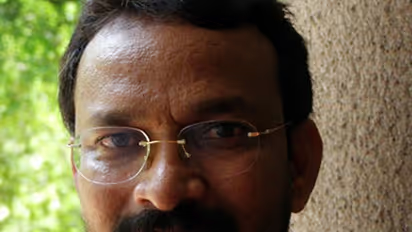Bezwada Wilson: A ‘thoti’ who led the fight for change in Karnataka

Synopsis
Berzwada Wilson, a Dalit activist born in Karnataka, has been conferred with the 2016 Ramon Magsaysay award for "asserting the inalienable right to a life of human dignity."
Born in a community of manual scavengers in Kolar, Wilson was teased by his friends, who called him 'thoti' (scavenger). But his parents, who wanted to shield him from humiliation, told the young boy that his friends called him that because of the huge garbage bin beside their house.
When Wilson turned 18, he found out that his parents were not "miners" working in the Kolar fields. Instead, they were actually dry latrine cleaners.
Their job as manual scavengers involved clearing latrines of human faeces, usually with their bare hands.
A disgusted and horrified Wilson told The Indepedent that the revelation left him so depressed that he came close to committing suicide at a secluded water tower.
Frustrated with the life that he has been dealt with, Wilson decided to break away from his traditional confines. However, even after completing his Graduation in Political Science, when he approached an employment exchange for a job, the government official put his desired job interest as 'scavenging', without Wilson's consent.
That was the last straw. Wilson began his fight to end manual scavenging in 1986.
Bezwada began writing letters to KGF authorities, ministers, the chief minister of Karnataka, the prime minister and newspapers. But his letters remained largely unacknowledged. It was not until 1994, when photographs taken by Bezwada of dry latrines and manual scavenging in KGF were published in Deccan Herald that the Karnataka government was forced to acknowledge for the first time that manual scavenging was a problem that needed to be addressed.
The issue even stirred up a major debate in the Union Parliament.
He would eventually lead a nationwide movement named ‘safai karmachiari andolan’, bringing together Dalit activists. At the same time, he filed a PIL in the Supreme Court listing nationwide violators of the 1993 Prohibition Act. Manual scavenging was termed illegal under this Act, yet the practice had continued even after that.
An Ashoka Fellow, Wilson’s profile on their website reads: “His organisation, Safai Karmachari Andolan (SKA), has served as a watchdog pushing for legal action to demolish dry toilets across India and prepare manual scavengers, most of whom are Dalits, to pursue new sources of income. Through a strong volunteer network of 6900 members, who are either scavengers or their children, SKA has directly reached more than three lakh manual scavengers.”
It also states that because of his efforts the total number of manual scavengers in the country has come down to 2 lakh in 2013 from more than 15 lakh from a decade ago.
Stay updated with the Breaking News Today and Latest News from across India and around the world. Get real-time updates, in-depth analysis, and comprehensive coverage of India News, World News, Indian Defence News, Kerala News, and Karnataka News. From politics to current affairs, follow every major story as it unfolds. Get real-time updates from IMD on major cities weather forecasts, including Rain alerts, Cyclone warnings, and temperature trends. Download the Asianet News Official App from the Android Play Store and iPhone App Store for accurate and timely news updates anytime, anywhere.